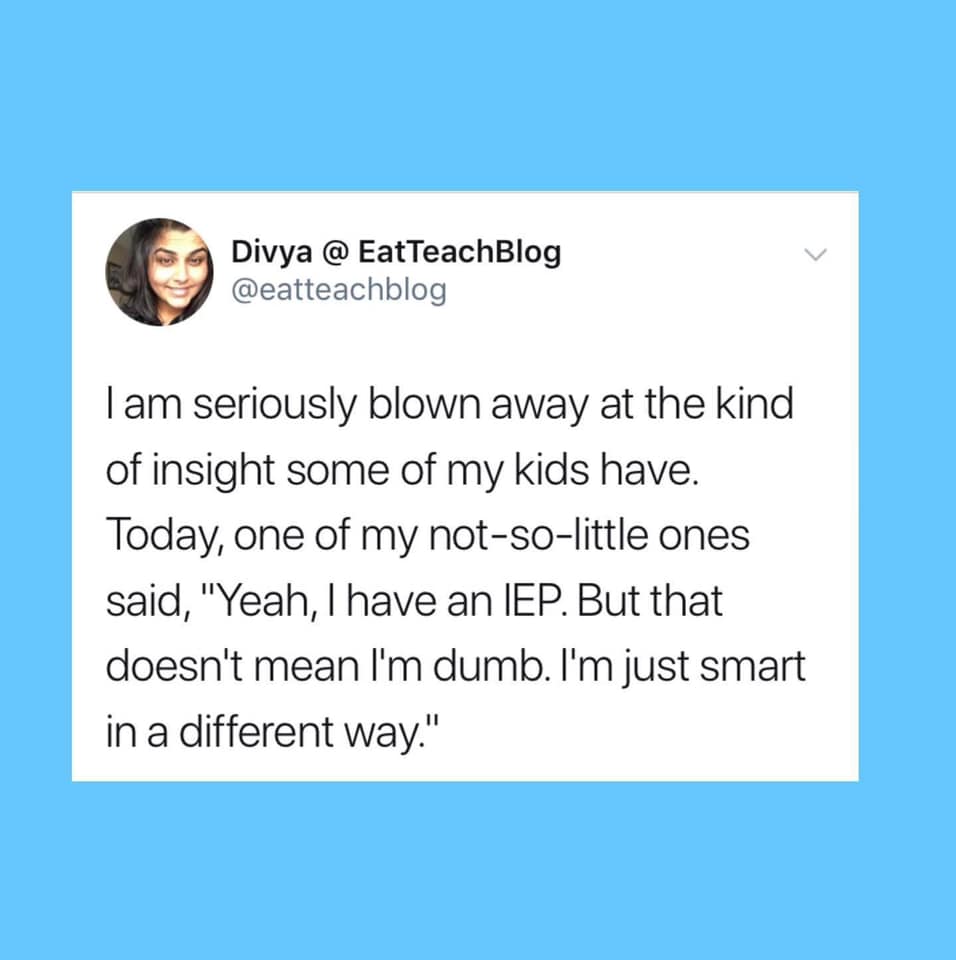For some families,celebrating the Fourth of July and seeing fireworks is tradition. With it,comes parties, food, parades,red/white/blue decor and loud music. For some families, they plan for this day for months or even a year ahead. It is the highlight of the summer... but not for everyone.
0 Comments
As Back to School is just around the corner for most, some even started already!, the topic of IEP may be creeping into your mind or conversations. To start, what is an IEP?
An IEP is an individualized education plan for YOUR child-each child first has to be tested and qualify for a disability according to state standards. Then the child has to also qualify by state standards for needing special education . If they do, a team of parents and school staff will create a plan for the child. Many people think that there is a negative stigma attached to an IEP and often turn it down out of pride. Others fight hard for one, when their child does not have a need for one. What is important is that as a parent, you voice your opinion, your concerns and why you think your child does or does not need one. School staff will help you navigate the ins and outs of the law and requirements to see if your child does need one. After the team (including parent ) decides if a student has a need for special ed, the IEP will be written. The team will look at your child's strengths, areas of need and create goals to help your child succeed in school. Sometimes, it will be a goal related to hearing related equipment. Sometimes, it will be a goal related to language . Sometimes, it is a math or reading vocab goal. After the goals are created, then the service provider will be discussed. Some districts have Special Ed Teachers who teach academic skills to kids who have hearing loss and the Deaf/HH Teacher just works on hearing related topics and skills. Other districts, the Deaf/HH teacher does it all. Be sure that your child has a Deaf/HH teacher on the case if your child has any testing or an IEP. It is illegal for a district to say that they don't have one and your child does not need one. Deaf/HH Teachers have special training to work with your child and educate other staff who work with your child. Do not speak/sign ill of an IEP around your child; they will catch the negative vibe and then be embarrassed. There is nothing to be embarrassed by. Think of an IEP as a tool to help get your child accommodations and modifications they need. If your child needed crutches or a wheelchair, you would not say," Nah, that is too extra, they should just try harder to walk." Use the tools provided in order to help your child see that they can be successful. Deaf and hard of hearing children can do anything that hearing children can do. If you have any questions about IEPs or your child's IEP in specific, please feel free to email [email protected]. Cheers to a personalized and positive IEP for your kid!! Summer has been rolling along for a good month now. Kids have had time to decompress from school, shake off the cold and get into the sun. Some kids have camp, others have swim lessons, others have horseback riding lessons and others are just at home. Regardless of what they are doing, kids with hearing loss may encounter more barriers than kids who are hearing. Each situation is different, as each child communicates differently , has a different hearing loss and uses or does not use hearing assistive devices.
Please remember that when children take off their hearing assistive devices (cochlear implants, hearing aids, BAHA,etc), their hearing is diminished. They may not have the ability to hear all of what you are saying, understand all you say, hear and understand well in noise , or even localize sound . Here are some gentle reminders of how to accommodate and include your kids in conversation and language this summer. 1. If you and your family use ASL as your primary or secondary language, that is very helpful, as kids can see your signs from far away, vs understand spoken language from far away. 2. Use some sort of visual /gesture predetermined signals , especially at a pool or in a busy and noisy environment. I have had parents tell me their kids do not come in from the park/pool etc when they are called, despite the parents having a visual cue. However, in reality, the kids are not clear on the cue and may not know it means "5 min warning," or "Time to come in." 3. Do not say, "Never mind" or "It is not important" if your child asks what you or someone around them said. If it was important enough for someone to say, then it is important enough for your child to understand. Repeat it, rephrase it, act it out, sign it-whatever it takes . 4. Be sure to explain rules and plans for the day while the child is near you and is able to understand you fully. It is setting up a situation for disaster if you explain rules on the pool deck or in the middle of a noisy zoo. 5. ASK your child what fun activities they like to do , where they feel most included and are most comfortable with their hearing loss. Summer is a time for some kids to relax and not have to focus so hard on their listening skills 24/7, so they may prefer swimming or an art activity, where there is not a lot of language and listening needed. I hope you continue to have a wonderful summer. As always, reach out if you have questions or concerns. Whelp... that's a wrap! I am an officially RETIRED Deaf and Hard of Hearing Teacher.. I honestly have not been able to wrap my head around this yet, as I am used to having summers off. I am used to not getting up on a Monday in the middle of June... I think it will hit me more when fall comes around and the school supplies start showing up in Target-ok,let's be real..they will start showing up mid July!
I wanted to take a moment and say THANK YOU to all the parents, teachers, administrators, paras, secretaries, custodial staff, nurses, food staff , special ed staff and students who have crossed my path in the last 30 years. To say this has been an easy ride would be lying..but to say it has been anything but beautiful would also be lying. I have LOVED working with kids who have hearing loss. I love showing them that they CAN do anything they want in life. I love teaching staff that these kids CAN do things, but rather that the staff needs to adjust how they teach. I am obsessed with American Sign Language and hope to find many ways to continue to use it in my life moving forward. I am literally moving to AZ in the next few months, so I will be searching out a new Deaf community to join-as outgoing as I may seem, I am VERY shy at first. So, if you are in AZ , please reach out and welcome me so I can get past the shyness!! There have been the ever lasting debates around Deaf community, deaf as in a medical view, Hearing Impaired vs hearing loss vs hard of hearing ... Speaking vs signing... ASL vs PSE... I am NOT someone who is Deaf or Hard of Hearing ,so I can not fully speak on the topic-but what I will say, is in all my years, I know that if your child is surrounded by good hearted, open minded people, your child will get the support s/he needs to be successful. As a parent, go into school and communication with open minds, knowing that there is not one right or wrong answer and that you CAN change your child's school placement or mode of communication or language. I have regretted a lot of things when it has come to my own kids and they have actually taught me that we can't look back-just look forward and make changes when we learn more. I am going to continue this blog hopefully more regularly and definitely keep up the 2 Forever Friends site on Facebook. My books are here-I am looking forward to doing virtual and in person book talks and book signings and am here to be an advocate for you and your child at school IEPS. I am just an email away. Take time this summer to RELAX, PlAY and ENJOY your kids!I know I did !! Thanks for sharing your kids with me. -Mrs. Schley, MEd Retired Deaf and Hard of Hearing Teacher Summer is fading fast and schools are stocked with Back to School Specials and School Supplies. Teachers and students alike are frantically trying to get one more dip in the pool, one more quick vacation, one more late night icecream before summer fades into fall. It is so true that summer goes far faster than Jan, Feb and March.. time is truly a mystery.
The last few years have been..well, tough, for students and staff. Pandemic, school closures, masks, no masks, masks, virtual learning, virtual teaching, rules of what can and can't be taught, children relearning how to literally sit and listen or sit and watch.. mentally and physically exhausting for all. Due to these issues and more, many staff are fleeing the profession. There are limited Deaf and Hard of Hearing teachers to start with, because the DHH population is only 10% of the population... and now with staff leaving, where does this leave your child and our teams? Many districts are choosing to hire teachers without licenses. Some feel that if that person was in the military, they know discipline. Some feel that if that person was a skilled welder, or studied History in college, they have the knowledge to teach a subject. I strongly believe staff need training in how to teach a child. I believe teaching starts with a child's heart. As Flip Flippen states and teaches, "Capture a child's heart and you will capture their mind." We need to see children as whole humans. .. whole children who need love, attention, understanding patience, differentiation and respect. They also need to be taught their abc's, reading, science, history and math. Staff needs support from home and at school. I believe neither home nor school can educate our children. We must work together to create safe spaces for our kids. Get your kids excited about the upcoming year. Create a resource to share with your child's teacher about their strengths , interests and areas of need. Help your teacher see your child as the wonderful and unique person they are. Cheers to the rest of summer! Hello everyone and welcome back! I took a break , while life took its ups and downs.. I think it is so important that we all share the hard times and then the solutions you have found navigating virtual school for your children. I know as a Teacher of kids who have hearing loss, it's been a struggle. My students are not Deaf and do not sign.. some ways that has been easier, but also some ways it has been harder.
Virtual School Pros: no need for masks when communicating! My mouth and facial expressions are fully accessible during instruction. However, a con is that internet can be choppy and words can be hard to understand over the virtual platform. The bonus is we use Google Meet and it has an option of captions-great skill to teach your children!! However, when I want to do listening skills with my students, they are smart enough to know they can get help from captions, so that's a bit of a struggle!! Isolation is already a thing sometimes for kids with hearing loss, as they can't always hear the whispered jokes or giggles in class, and students often say,"Oh, it's nothing." VS taking time to repeat to children with hearing loss. That said, there is definitely more isolation noticed for all kids who are virtual,but I see my kids with hearing loss really missing that 1:1 in person interaction. We focus alot right now on the physical health and safety for people during this time-please take note of your children's mental health, too. This is a tricky time for staff and students,but I also feel like it is a great time to work on advocacy skills-kids have to be very specific in telling me what part of their hearing equipment is not working, so we are learning parts , etc. I want to hear some of the struggles and how they have overcome them. Please leave a comment below!! As a teacher of kids with hearing loss, I often get the question, "How often should my kid wear hearing aids a day?" My answer is always, "How many hours is your child awake, minus bath or shower time?" I usually am greeted with a blank stare.
Families have the misconception that they can have their kids just use their hearing aids at school. Hearing aids are different than glasses... they are vital for picking up information that we "over hear " or are not taught directly. Yes, you can learn to see things as well, with glasses, but the language piece you miss when your aids are off (if you are not a sign user) is huge. We send kids home with math homework and English work, because we want them to practice what they learned at school. The same thing comes wth hearing. Kids need to practice what they heard at home. They will also learn new vocab from the TV , their siblings and the dinner table. If parents treat language and hearing aids as a positive, then the kid will be excited to play with sounds and language. That being said, it is exhausting for kids with hearing loss to learn and listen and learn. So by days' end, they may want a break-work with your child and see if they want an hour break after school or an hour off before bed. The more you hear , the more you will learn! Let's face it, if you are a parent, you have encountered a child who has been angry or has had a tantrum at one time or the other. That's normal behavior, albeit annoying at times.
However, think about your child with hearing loss. Does he or she seem to tantrum more often than other children? Does he or she toss things? Does he or she hit? Does he or she not follow directions? I am going to ask you to read this post when you are NOT going through one of the above situations, so you are more calm and level headed. Children with hearing loss often have difficulties communicating. They can't always articulate their wants, needs or desires. They can't always understand what you want from them and don't always understand your facial expressions until you get to the point of full out anger. These are all normal experiences that children with hearing loss go through. It is very frustrating at times for them. They don't understand or aren't able to express themselves right, and then Mom or Dad get mad and they seriously are confused as to why they get in trouble. Work with your child. Look at him or her when you are communicating so that there is a clear path for information to flow, whether it is signed or spoken. Get your child's attention before you request something, so you are sure he or she truly can hear and understand. Stop what you are doing and pay attention when your child is requesting something. Encourage him or her to keep explaining with gestures, more words, more signs,etc, if you are unsure-just don't say, 'oh, forget it.' Most of all, give your child and yourself time and space and allow the communication to grow and evolve. Don't punish, but rather try to figure out ways to improve communication and lessen frustration. If you are frustrated, I guarantee, your child is,too.  Holidays are full of hustle and bustle, tradition, travel , noise and family .For most of us, it has a bit of stress added in. For children and adults with hearing loss, there can also be extra stress and loneliness. At first thought, you might find this odd..this is the BEST time of the year, right? Well, try to imagine yourself from their point of view. If a child or adult only signs and the family and friends with whom they get together with during the holidays do not sign, this makes communicating very hard. Perhaps some people have taken time or interest and know some basic greetings..but after that, people often talk quickly and move on. If a child or adult uses listening and spoken language, it is not necessarily much easier. People speak fast, there is background noise, people are moving all over while talking, which distorts their voice and makes it very hard for someone to speech read. Often, children and adults with hearing loss became extremely lonely and feel left out. There is hope. Plan ahead. If you are inviting people with hearing loss to your home, have paper and pencil or technology available to make communication flow easier. If you are a parent or spouse of someone with hearing loss going to someone's home, bring some communication options along. Set up seating in a semi circle, so people can all see each other. Remind people to get the person with hearing loss' attention first, before speaking or signing. This may not make the communication perfect, but it will allow that person to feel intentionally included. This helps that person want to advocate more and some of the loneliness can disappear. Another great idea is to buy some movies or books for the child with hearing loss that have characters in them who have hearing loss, so they can relate. It is also a great idea to get them for the families who don't have hearing loss, so they can start to learn about hearing loss. People in 2018 are very aware of labels, names, categories, etc. It is not politically correct to call people "disabled",but some people prefer to be called 'disabled.' Others prefer to be called "differently abled." I have learned long ago, that it is not my place to decide what to "label" or "call " people. I do my best and hope people will politely share with me how they would like to be addressed.
When it comes to hearing loss, there are many ways people want to be addressed. Some people say, "Deaf". Some people say, "deaf". Some people say, " hearing impaired," while others feel offended by that term. Some people say, " hard of hearing " even if they have no hearing and use a cochlear implant. When I work with my students, I try to explain the medical terms vs the cultural terms. It is not my place to decide for them how they refer to themselves,but I do try to educate. If a person is 'deaf', that literally means that on an audiogram, when their hearing is tested, they have a significant hearing loss. That means they can not hear without amplification. For some, it means that even with hearing aids, there is no understandable hearing. This person may use a cochlear implant and be able to understand spoken language after much therapy. For someone to be labeled "hard of hearing", it usually means a person has hearing loss,but in the mid ranges. This person does get benefit from a hearing aid and is able to understand spoken language. When a person identifies himself as " Deaf", it is related to culture. It means he feels he belongs to the Deaf culture-knows/uses American Sign Language, does not feel like he has "lost" anything because he can 't hear some or all spoken language. He may have a significant hearing loss or a mild one,but it is how he culturally feels. A person who calls herself "hearing impaired " usually is someone who fits in more with the hearing world and sees the hearing loss as a deficit medically, not a culture. There is no right or wrong way a person should label herself. People 's perspectives and understanding of their hearing losses may change over their lives, due to changing hearing loss or due to the people they meet. It saddens me when one group tells the other group that they are wrong. My hope is that people in both the 'deaf' and the "Deaf" community can come together and be open for all people to flow in and out of each group. |
Allison Schley is a teacher of deaf and hard of hearing children. She took her passion for kids with hearing loss and became an author. She wants all children with hearing loss to know they are amazing and that hearing loss will not keep them from following their dreams.Archives
July 2023
Categories
All
|








 RSS Feed
RSS Feed
